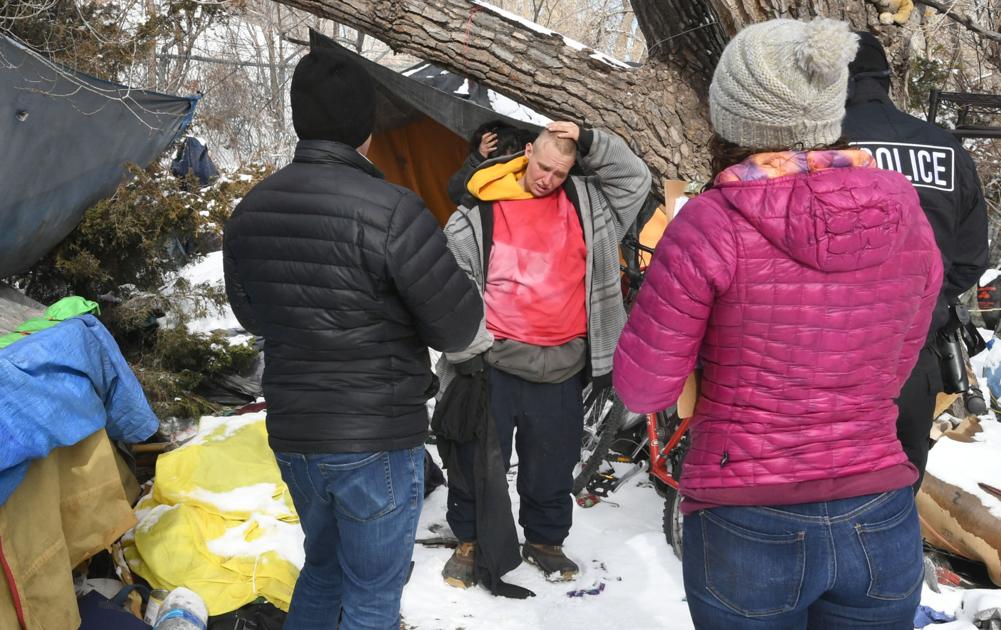Agencies that assist the homeless in Colorado Springs will not be conducting the annual head count this month of people living outside in tents and camps, under bridges, in vehicles and in abandoned buildings, officials said Wednesday.
The ongoing coronavirus pandemic has led the U.S. Department of Housing and Urban Development to provide exceptions to counting requirements, which are necessary for communities to receive federal funding.
With HUD and local approval, the Pikes Peak Continuum of Care has called off the “unsheltered” portion of the Point in Time survey, said Evan Caster, manager of homeless initiatives for Community Health Partnership, the administering agency for the Pikes Peak Continuum of Care. The group consists of homeless service providers, advocates, local government leaders and community members who work to eliminate homelessness in El Paso County.
Planning for the massive undertaking normally begins in the summer and involves training some 150 volunteers to assist with locating homeless people and families and asking them to fill out the survey.
But the number of “sheltered” homeless people staying in emergency shelters, transitional and temporary housing still will be tallied, Caster said, using information from when people check in to eat at soup kitchens or stay overnight at shelters.
Protecting the workers, volunteers and the unsheltered homeless population is the main reason for the boots-on-the-ground part of the survey being canceled.
Caster said the survey takes about 20 minutes for individuals to complete, which increases “the risk of exposure” to COVID-19 for all involved.
Colorado Springs’ two largest shelters had outbreaks of COVID-19 among staff and clients in recent months.
In addition, “As we look at homelessness, it’s not just one night in the middle of January — it’s all the time,” he said.
Agencies are re-evaluating how they count the unsheltered and are moving toward tracking the numbers on a monthly basis for all homeless populations, with the goal of improving services, Caster said.
Organizers say because the survey is voluntary and because some of the camps are difficult to find, the numbers are always lower than the reality of how many homeless are in the community.
Last year’s Point in Time survey, conducted on Jan. 27, showed 358 unsheltered homeless people, which represented a 30% decrease over the 2018 community high of 513 unsheltered people.
Adding in “sheltered” homeless brought the 2020 total to 1,339 people self-identifying as homeless. That represented a 17% decrease from January 2019, when 1,562 people said they were homeless.
But more people are using homeless services, statistics show. A total of 5,320 people took advantage of local services in fiscal year 2019, a 10% increase over 2018.
“Homelessness still exists,” Caster said, “and it’s not going away.”
In the past few years, Colorado Springs has focused on adding more emergency shelter beds, which now top 700, though hundreds typically go unused each night, as people continue to sleep outside year-round.
Additional federal COVID-relief funding specifically to address homelessness is expected to help improve the city’s low-income housing situation. More than 700 people are on a waiting list for subsidized housing, Caster said.
Having enough housing and landlords who accept government vouchers are critical in reducing homelessness, Caster said.
“We know it’s one of the biggest barriers,” he said.
Through a Coordinated Entry program, 204 people were moved into housing in 2019, and in 2020 through October, 180 people were housed through that program alone, Caster said.
“We want to use more resources to have more people exiting homelessness,” he said, “so they’re not caught in the cycle.”
The city’s Community Development Division is accepting applications for a second round of about $1 million in federal COVID-relief funding for projects that prepare for, prevent and respond to the pandemic and its impacts. The deadline is Feb. 5.
Improving safety in shelters and programs known as rapid rehousing — meaning short-term rental assistance and related services — are priorities. However, street outreach, homelessness prevention and data collection also are being funded.
The application form is at https://coloradosprings.gov/community-development/article/news/invitation-apply-2021-emergency.
This content was originally published here.

